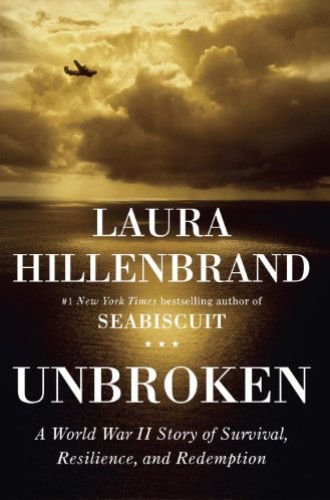An astonishing life
A few weeks ago, on my way home on a crowded rush-hour train, I was
slouched down in my seat trying to hide my uncontrollable crying. I was sobbing
not for the lost souls of the world but because I had reached the end of Unbroken,
a new book by Laura Hillenbrand. As embarrassing as my public display of
emotion was, I could not stop reading.
Unbroken is the story of Louie Zamperini, who had (and is still having!) one
of the most eventful, tragic, exultant, inspiring lives you'll ever hear of.
Hillenbrand called his life "incomprehensibly dramatic." He was a maniacal
troublemaker and thief as a child, a national high school track star, a 1936
Berlin Olympian, a WWII Army Air Corps bombardier, a veteran of many fierce
battles, survivor of a plane crash followed by 47 days at sea, and a prisoner
in a Japanese POW camp.
Reading Unbroken is an exercise in astonishment. There is not
a single phase of Louie's life that doesn't touch the extremes of the human
experience. Just as she did with Seabiscuit, her earlier bestseller,
Hillenbrand writes with an engaged but calm voice, letting the drama of the
story prove itself and letting you fall in love with Louie on your own. And you
will fall in love with Louie,
the rambunctious Italian who plays pranks on his Japanese prison guards, just
as he did with Olympic teammate Jesse Owens.
Given the title--and the subtitle and the preface, in which
Hillenbrand talks about interviewing Louie for the book--you don't have to
worry about whether or not he survives. But after a while you start to worry
about how he'll go on living. There is a moment, when his life raft is drifting
into eerily calm waters at the equatorial doldrums, when Louie feels he is face
to face with heaven. He vows that if he survives the war he'll dedicate himself
to serving others, a vow that seems less and less likely to be kept after years
of atrocious life in a POW camp.
Trying to keep hold of the conviction that he is or ever will be an
unbroken person again--let alone the charismatic, selfless one he was before
the war--is the real survival struggle of the book. If you are anything like me
(or my dad--I quickly handed the book off to him without waiting for Christmas),
it's a struggle you'll follow with devoted concern, and it will stay with you
long after you close the book.




